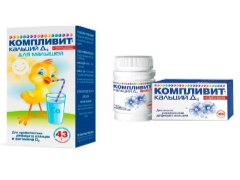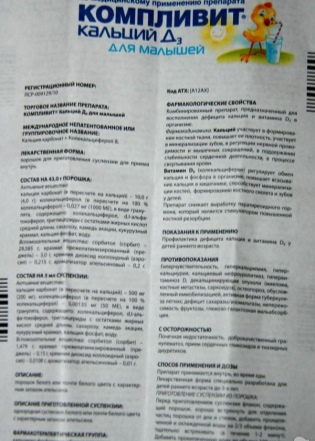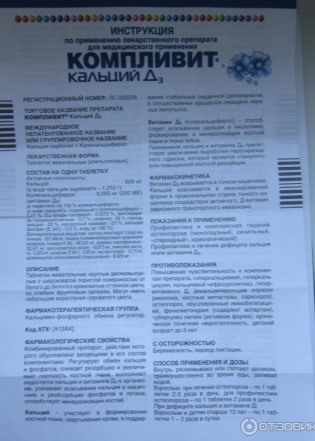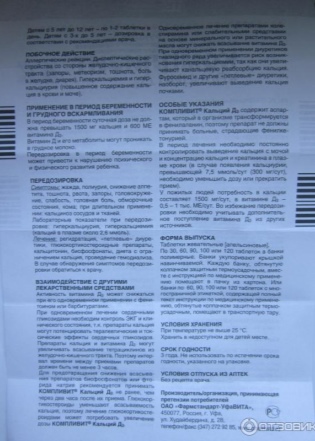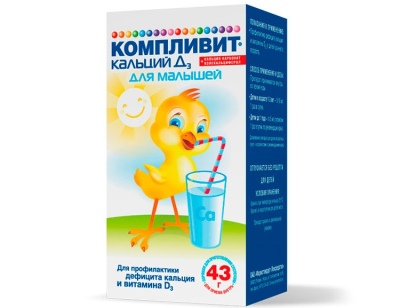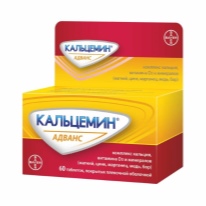Complivit Calcium D3 for children
If a child needs calcium and vitamin D, he is prescribed combination preparations containing both such beneficial substances. One of them is Complivit Calcium D3. In what forms is it produced and when is it prescribed to children?
Release form and composition
Supplement produced in several ways:
- The powder from which the suspension is made. On the box of such a drug there is a mark “for babies”, because this remedy can be given to babies from birth. In the package of such Complivit there is a glass bottle with 43 g of white powder with an orange smell and a measuring spoon. After mixing with water from this medicine, 100 ml of a homogeneous white suspension with an orange flavor and odor is obtained. Its active substances are calcium carbonate (in terms of Ca, its concentration in 5 ml is 200 mg) and vitamin D (its amount in 5 ml of the drug is 50 IU). Additionally, the syrup contains sorbitol, aerosil, triglycerides, sucrose and other compounds.
- Chewable tablets. This form is prescribed from 3 years of age. It is represented by round white mint or orange tablets, packaged in plastic jars of 30 and 100 pieces. Each tablet acts as a source of 200 IU of vitamin D and 500 mg of calcium in the form of carbonate. Additionally, the drug includes acacia gum, sucrose, povidone, citric acid, aspartame, milk sugar and other ingredients.
Tablets are not prescribed for phenylketonuria. For children with renal insufficiency, the drug is given with caution.
In addition, for children over 12 years old, an additive with the mark “forte” is produced. These are also chewable tablets with a mint or orange flavor. Each such tablet contains 500 mg of calcium, supplemented with 400 IU of vitamin D.
Operating principle
The drug helps to eliminate the deficiency of vitamin D and calcium, which is especially important during the active growth of the child. Vitamin D3 in the composition of the supplement is important for the metabolism of both calcium and phosphorus. Thanks to this vitamin, minerals are better absorbed from food in the intestine, with the result that the skeleton and teeth of the child get them in the right amount. Calcium included in the preparation is important not only for bone density and mineralization of teeth, but also for muscle contractions, blood coagulation, stable heart function and conduction of nerve impulses.
Indications
Complivit Calcium D3 is prescribed for calcium deficiency or vitamin D deficiency. The supplement is recommended when there are not enough of these compounds in food, for example, if the child does not consume dairy products. It is also prescribed for diseases of the teeth, fractures and other problems with the bone system.
Contraindications
The drug should not be given to children with:
- Hypersensitivity to any ingredient supplement.
- Calcium stones in the kidney.
- Hypervitaminosis D.
- Decalcified tumors, such as sarcoidosis.
- Active pulmonary tuberculosis.
- Increased levels of calcium in the blood and urine.
- Fructose intolerance.
- Hereditary disorders of carbohydrate metabolism.
Tablets are not prescribed for phenylketonuria. For children with renal insufficiency, the drug is given with caution.
Side effects
Reception of Complivit Calcium D3 can provoke an allergic reaction. Other side effects when taken in the prescribed dose of a doctor is usually not noted.
Instructions for use
Any type of Complivit Calcium D3 should be taken with meals. To prepare suspension in a bottle add boiled chilled water.First, 2/3 of the vial is filled with water and the powder is mixed for a few minutes, after which a little more water is added to the neck. Shake the bottle before each use.
A child of the first year of life (for example, at 5 months) is given the suspension once a day in an amount of 5 ml. Children aged 1-3 years, the tool is also prescribed once in 5-10 ml per reception. For older children, the doctor must determine the dosage. Prophylactic suspension is prescribed for 1 month.
Tablet form advised to chew or dissolve. The dosage and mode of administration prescribed by the doctor. Usually, children 5–12 years old are recommended to take 1 tablet, and from the age of 12, 2 tablets per day. The duration of treatment is often 4-6 weeks.
Overdose
Excess doses of Complivit Calcium D3 cause an increased level of calcium in the bloodstream and urine. An excess of vitamin D may manifest constipation, muscle pain, arrhythmia, dizziness, impaired kidney function, and other symptoms. Excess doses of calcium carbonate can also lead to nausea, abdominal pain, bloating, and other signs of dyspepsia.
Terms of sale and storage
All types of Complivit Calcium D3 can be purchased without a prescription, and should be stored at home at room temperature in a dry place where the tool will not get a small child. The shelf life of the tablet form is 3 years, the powder (sealed bottle) is 2 years, and the prepared suspension is 20 days. The average price of the drug for babies in powder is 200 rubles.
Reviews
About suspension Complivit Calcium DZ most mothers respond well. The drug is praised for the opportunity to give at any age, ease of use and the absence of preservatives and dyes. About tablets, too, there are mostly positive reviews, in which they note good tolerability and no side effects.
Analogs
Replace Complivit Calcium D3 can be other additives that contain the same active substances. For example, a two-year-old child can be given Multi-tabs Baby Calcium +, from the age of three - Vitamishki Calcium +, and children over 5 years old are recommended Calcemin. In such preparations, there are calcium, and vitamin D, and some other compounds that are important for the child's body.
What is calcium for, see the transfer of Dr. Komarovsky.
